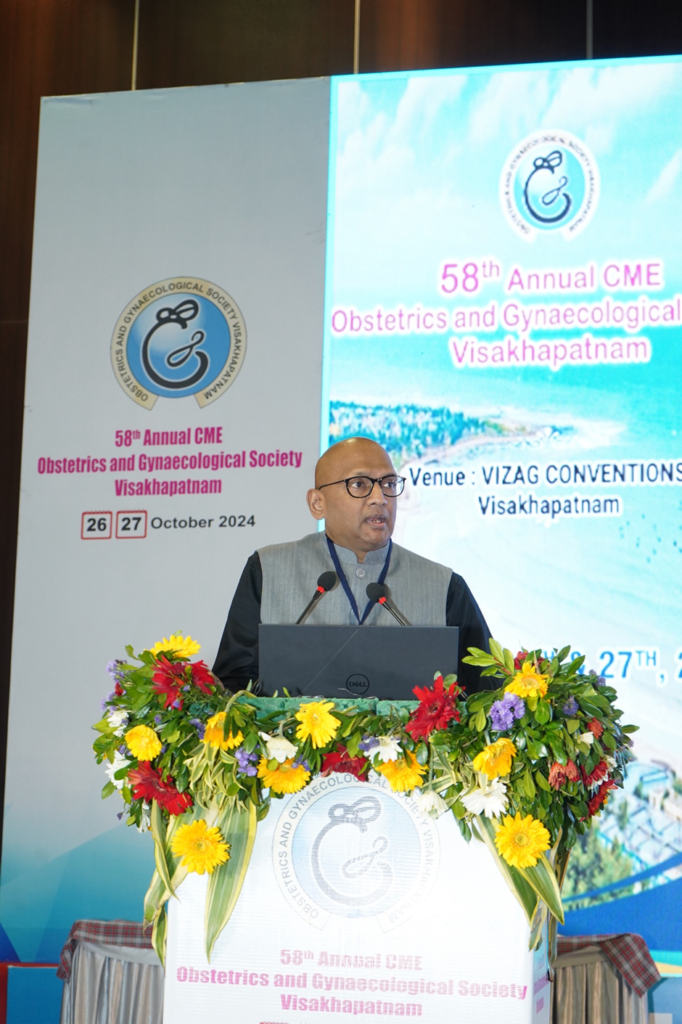Key Takeaways from Dr. Rama Raju’s Presentation at the 58th Annual CME 2024
The 58th Annual Continuing Medical Education (CME) event of 2024 brought together some of the most esteemed voices in reproductive medicine, creating a vibrant hub for learning, collaboration, and innovation. This year’s gathering, held in Visakhapatnam, attracted top experts, researchers, and clinicians eager to share the latest developments and breakthroughs in fertility treatment.

One of the standout sessions was led by Dr. G.A. Rama Raju, director of Krishna IVF Clinic, a premier fertility center in Asia known for pioneering advancements in reproductive medicine. Dr. Raju’s reputation as an infertility specialist and his commitment to refining IVF techniques made his presentation a must-attend event. His insights captivated attendees, covering essential improvements in IVF methodologies and showcasing Krishna IVF’s cutting-edge approach to patient care.
Dr. Rama Raju’s session was a deep dive into the latest innovations in IVF, all geared toward improving patient outcomes while streamlining clinic operations. Here are some of the key topics he covered:

–Enhanced IVF Techniques: Dr. Raju explored advancements in controlled ovarian stimulation, focusing on methods that maximize egg retrieval while minimizing patient discomfort. His approach emphasizes personalized protocols, tailored to meet each patient’s unique needs, resulting in higher success rates and a smoother experience.
–Advanced Embryo Monitoring and Assessment: Krishna IVF is well-regarded for its state-of-the-art embryo assessment tools, including Polscope technology, which aids in egg quality evaluation, and time-lapse monitoring, which allows for detailed embryo observation. Dr. Raju shared how these technologies provide invaluable real-time data, helping embryologists make informed decisions that improve embryo selection.
– Genetic Screening in IVF: Dr. Raju highlighted Krishna IVF’s integrated genetics department and the value of genetic screening, especially in cases of recurrent pregnancy loss and unexplained infertility. Early identification of genetic issues enhances the likelihood of successful, healthy pregnancies, making genetic integration a game-changer in IVF treatments.
– Intracytoplasmic Sperm Injection (ICSI): Dr. Raju gave an overview of ICSI, a specialized technique for overcoming male infertility, where a single sperm is injected directly into an egg. Since Krishna IVF introduced this technique in Andhra Pradesh in 1998, the clinic has continued to make strides, advancing male infertility treatment significantly.
Krishna IVF Clinic’s Impact on Fertility Treatment
Dr. Rama Raju’s achievements at Krishna IVF have propelled the clinic to the forefront of fertility care in Asia. Founded in 1996, Krishna IVF was among the first centers in India to embrace advanced reproductive technologies, maintaining a focus on personalized patient care. Today, with a team of highly skilled gynecologists, embryologists, and geneticists, the clinic has supported thousands of families in their journey toward parenthood.
At the CME, Dr. Raju’s session offered a window into how genetics and technology are transforming reproductive health, reducing risks, and increasing IVF success rates. His presentation encouraged lively discussion, inspiring attendees to explore how these advanced methods might be applied globally to improve patient outcomes everywhere.
Dr. Rama Raju’s session at the 58th Annual CME 2024 underscored his commitment to innovation, research, and the continuous evolution of fertility treatment. By staying at the cutting edge of reproductive medicine, Dr. Raju’s work offers hope and new possibilities for patients worldwide. For professionals in reproductive health, his achievements at Krishna IVF are a testament to how dedication to advancing care can make a profound difference in patients’ lives.
Dr. Raju’s contributions remind us that the field of fertility treatment is ever-evolving, with each breakthrough bringing us closer to making parenthood possible for more families.
